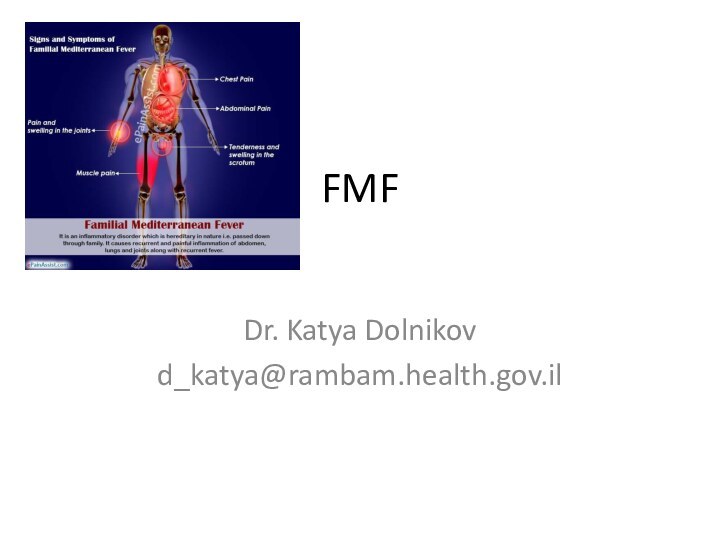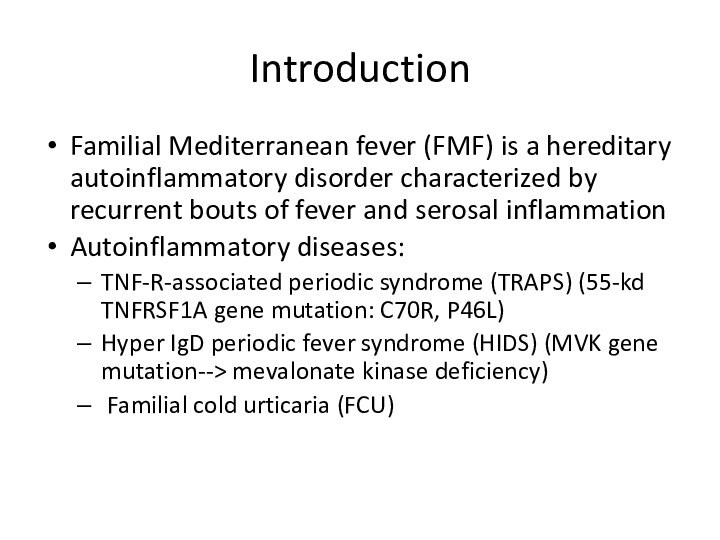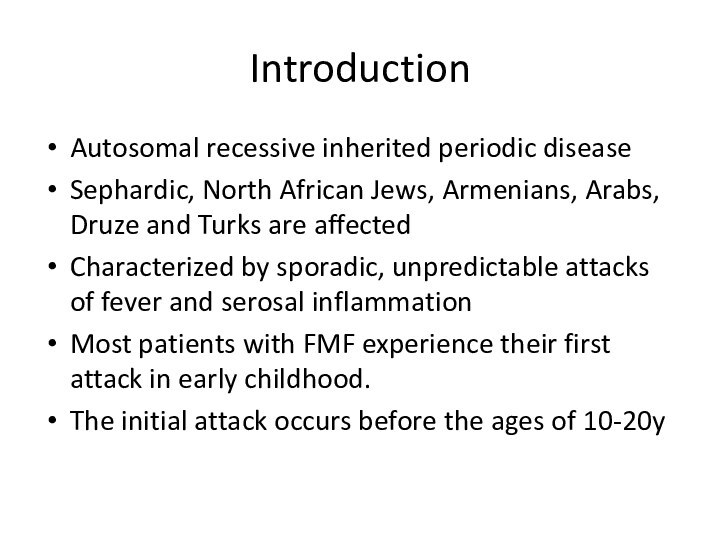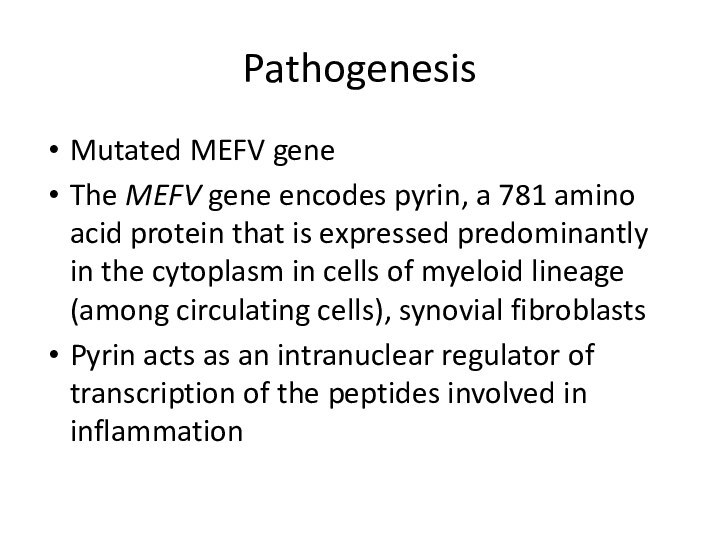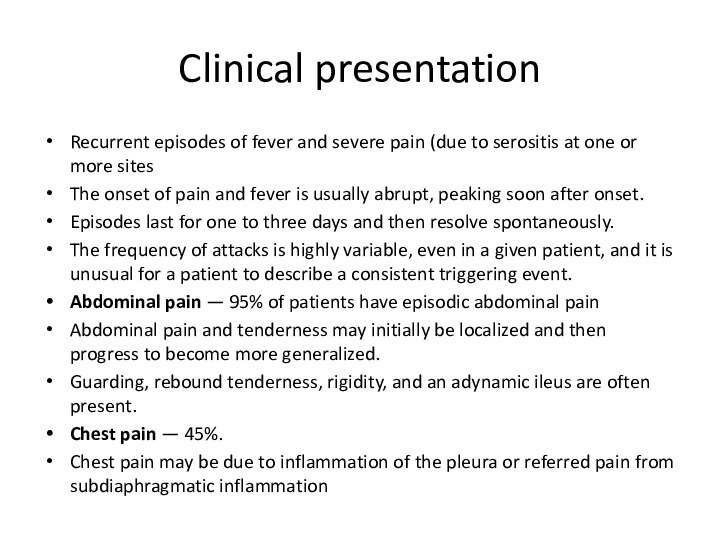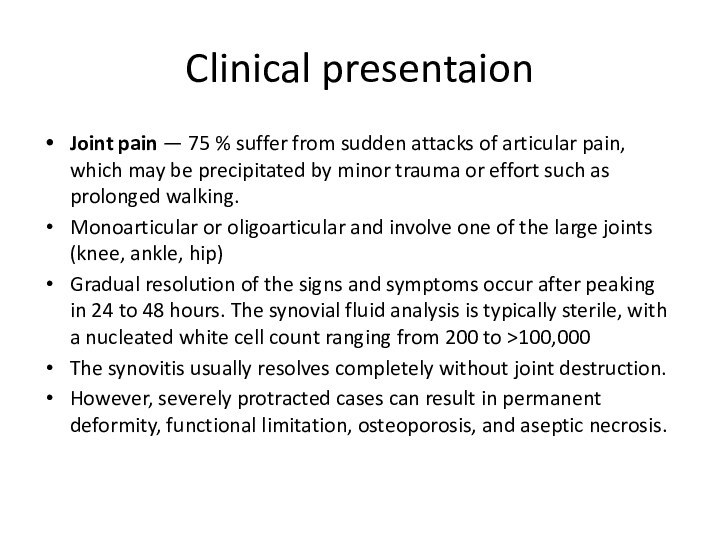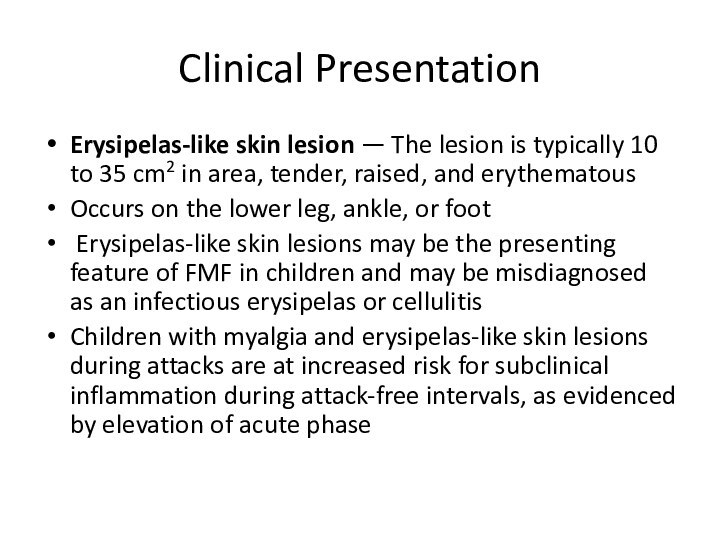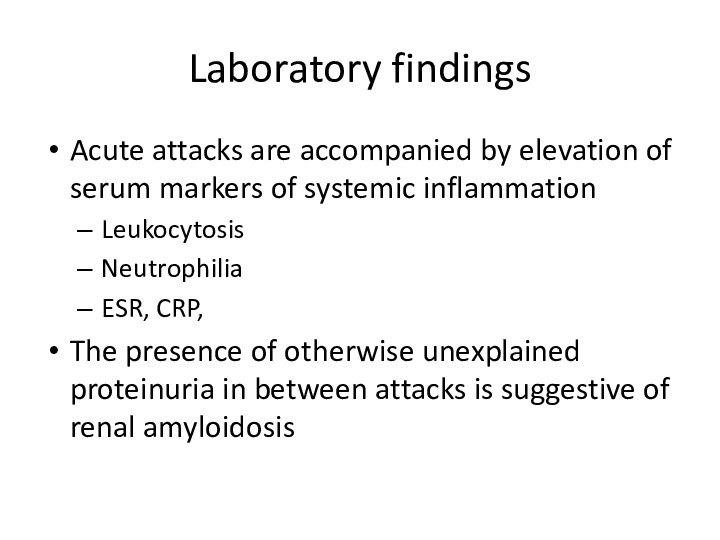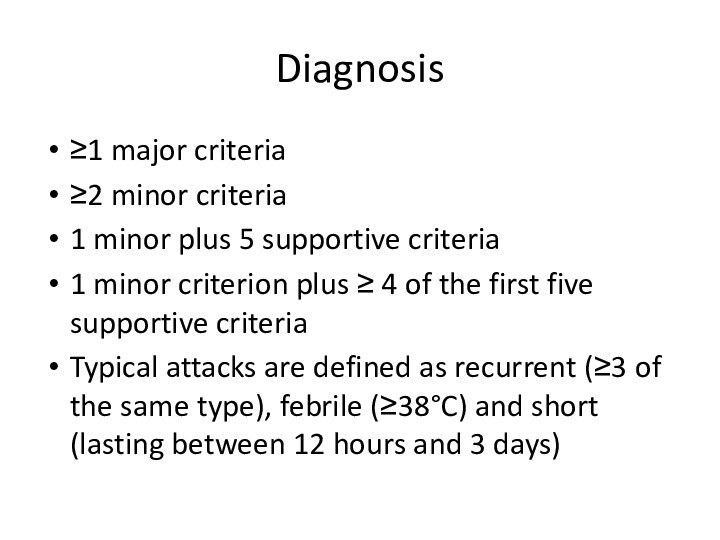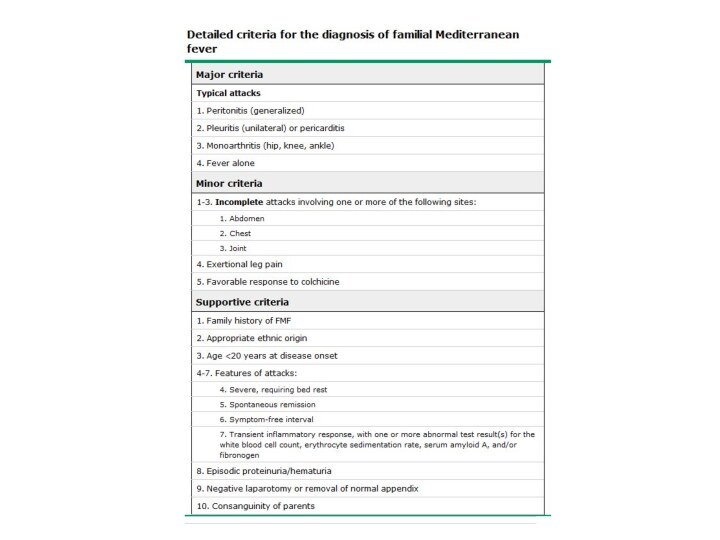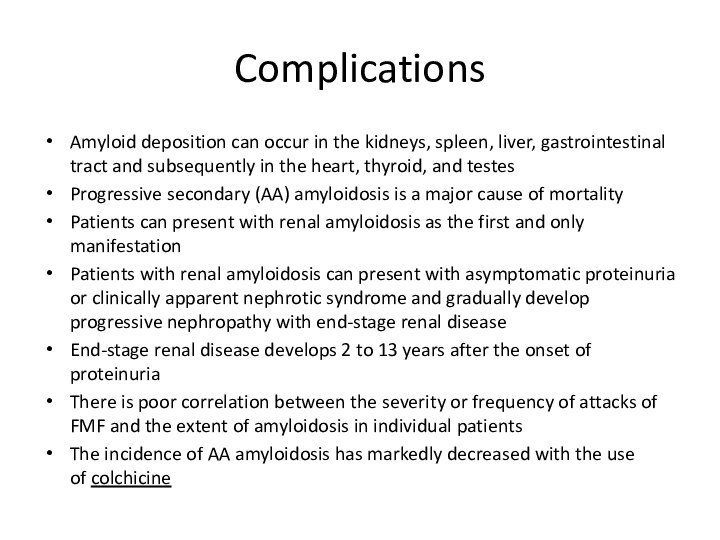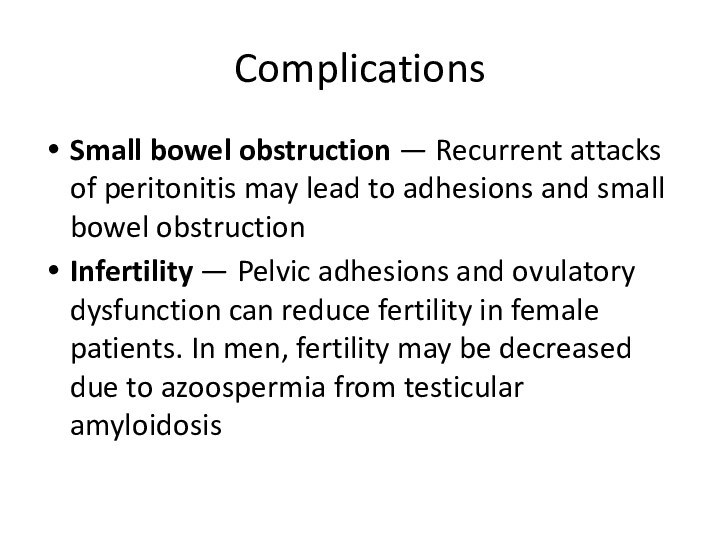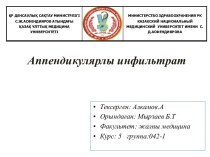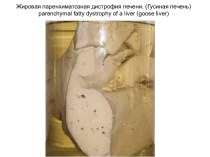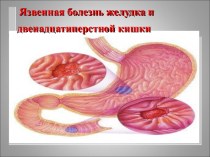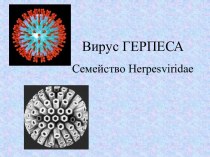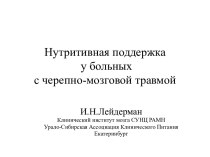Слайд 2
Introduction
Familial Mediterranean fever (FMF) is a hereditary autoinflammatory
disorder characterized by recurrent bouts of fever and serosal
inflammation
Autoinflammatory diseases:
TNF-R-associated periodic syndrome (TRAPS) (55-kd TNFRSF1A gene mutation: C70R, P46L)
Hyper IgD periodic fever syndrome (HIDS) (MVK gene mutation--> mevalonate kinase deficiency)
Familial cold urticaria (FCU)
Слайд 3
Introduction
Autosomal recessive inherited periodic disease
Sephardic, North African Jews,
Armenians, Arabs, Druze and Turks are affected
Characterized by sporadic,
unpredictable attacks of fever and serosal inflammation
Most patients with FMF experience their first attack in early childhood.
The initial attack occurs before the ages of 10-20y
Слайд 4
Pathogenesis
Mutated MEFV gene
The MEFV gene encodes pyrin, a 781 amino
acid protein that is expressed predominantly in the cytoplasm
in cells of myeloid lineage (among circulating cells), synovial fibroblasts
Pyrin acts as an intranuclear regulator of transcription of the peptides involved in inflammation
Слайд 5
Clinical presentation
Recurrent episodes of fever and severe pain
(due to serositis at one or more sites
The onset
of pain and fever is usually abrupt, peaking soon after onset.
Episodes last for one to three days and then resolve spontaneously.
The frequency of attacks is highly variable, even in a given patient, and it is unusual for a patient to describe a consistent triggering event.
Abdominal pain — 95% of patients have episodic abdominal pain
Abdominal pain and tenderness may initially be localized and then progress to become more generalized.
Guarding, rebound tenderness, rigidity, and an adynamic ileus are often present.
Chest pain — 45%.
Chest pain may be due to inflammation of the pleura or referred pain from subdiaphragmatic inflammation
Слайд 6
Clinical presentaion
Joint pain — 75 % suffer from sudden attacks
of articular pain, which may be precipitated by minor
trauma or effort such as prolonged walking.
Monoarticular or oligoarticular and involve one of the large joints (knee, ankle, hip)
Gradual resolution of the signs and symptoms occur after peaking in 24 to 48 hours. The synovial fluid analysis is typically sterile, with a nucleated white cell count ranging from 200 to >100,000
The synovitis usually resolves completely without joint destruction.
However, severely protracted cases can result in permanent deformity, functional limitation, osteoporosis, and aseptic necrosis.
Слайд 7
Clinical Presentation
Erysipelas-like skin lesion — The lesion is typically 10
to 35 cm2 in area, tender, raised, and erythematous
Occurs on
the lower leg, ankle, or foot
Erysipelas-like skin lesions may be the presenting feature of FMF in children and may be misdiagnosed as an infectious erysipelas or cellulitis
Children with myalgia and erysipelas-like skin lesions during attacks are at increased risk for subclinical inflammation during attack-free intervals, as evidenced by elevation of acute phase
Слайд 9
Clinical presentstion
Acute pericarditis – small pericardial effusion detected incidentally
Clinical
features of pericarditis include chest pain (sharp and pleuritic,
improved by sitting up and leaning forward), pericardial friction rub, and widespread ST segment elevation on ECG
Acute orchitis – Acute scrotal swelling and tenderness due to orchitis is rare
Febrile myalgia – protracted bouts of febrile myalgia, up to six weeks. Usually involves the lower extremities but, in some cases, may be more . CPK is normal. Although the etiology is not clear, febrile myalgias may be due to an underlying vasculitis.
●Aseptic meningitis – rare
Слайд 10
Laboratory findings
Acute attacks are accompanied by elevation of
serum markers of systemic inflammation
Leukocytosis
Neutrophilia
ESR, CRP,
The presence of otherwise
unexplained proteinuria in between attacks is suggestive of renal amyloidosis
Слайд 11
Diagnosis
≥1 major criteria
≥2 minor criteria
1 minor plus 5
supportive criteria
1 minor criterion plus ≥ 4 of the
first five supportive criteria
Typical attacks are defined as recurrent (≥3 of the same type), febrile (≥38°C) and short (lasting between 12 hours and 3 days)
Слайд 13
Genetic testing
Used to support, but not exclude, the
diagnosis of FMF
FMF is usually inherited as an autosomal
recessive trait
Individuals who have two pathogenic mutations in the MEFV gene confirm the diagnosis
25% of patients who meet clinical criteria for FMF have only one identifiable mutation
Слайд 14
Treatment
The goals of therapy for familial Mediterranean fever
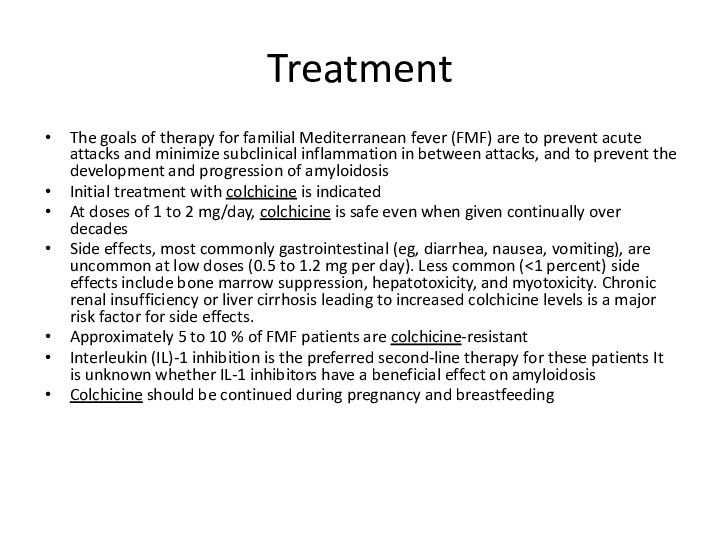
(FMF) are to prevent acute attacks and minimize subclinical
inflammation in between attacks, and to prevent the development and progression of amyloidosis
Initial treatment with colchicine is indicated
At doses of 1 to 2 mg/day, colchicine is safe even when given continually over decades
Side effects, most commonly gastrointestinal (eg, diarrhea, nausea, vomiting), are uncommon at low doses (0.5 to 1.2 mg per day). Less common (<1 percent) side effects include bone marrow suppression, hepatotoxicity, and myotoxicity. Chronic renal insufficiency or liver cirrhosis leading to increased colchicine levels is a major risk factor for side effects.
Approximately 5 to 10 % of FMF patients are colchicine-resistant
Interleukin (IL)-1 inhibition is the preferred second-line therapy for these patients It is unknown whether IL-1 inhibitors have a beneficial effect on amyloidosis
Colchicine should be continued during pregnancy and breastfeeding
Слайд 15
Complications
Amyloid deposition can occur in the kidneys, spleen,
liver, gastrointestinal tract and subsequently in the heart, thyroid,
and testes
Progressive secondary (AA) amyloidosis is a major cause of mortality
Patients can present with renal amyloidosis as the first and only manifestation
Patients with renal amyloidosis can present with asymptomatic proteinuria or clinically apparent nephrotic syndrome and gradually develop progressive nephropathy with end-stage renal disease
End-stage renal disease develops 2 to 13 years after the onset of proteinuria
There is poor correlation between the severity or frequency of attacks of FMF and the extent of amyloidosis in individual patients
The incidence of AA amyloidosis has markedly decreased with the use of colchicine
